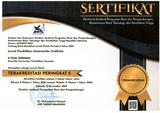PENGARUH PENERAPAN MODEL PEMBELAJARAN KOOPERATIF TIPE CO-OP CO-OP TERHADAP KEMAMPUAN PEMECAHAN MASALAH MATEMATIKA SISWA KELAS VIII SMP NEGERI 1 SUKASADA
DOI:
https://doi.org/10.23887/jjpm.v5i2.8321Abstract
Penelitian ini bertujuan untuk mengetahui apakah kemampuan pemecahan masalah matematika siswa kelas VIII SMP Negeri 1 Sukasada yang mengikuti model pembelajaran kooperatif tipe Co-op Co-op lebih baik daripada pembelajaran konvensional. Desain penelitian yang digunakan adalah Post-test Only Control Group Design. Populasi pada penelitian ini adalah seluruh siswa kelas VIII SMP Negeri 1 Sukasada kecuali kelas unggulan. Pengambilan sampel dilakukan dengan teknik random sampling untuk mendapatkan satu kelas kontrol dan satu kelas eksperimen. Skor kemampuan pemecahan masalah matematika siswa diperoleh melalui tes uraian yang diberikan di akhir penelitian kemudian dianalisis dengan menggunakan uji-t satu ekor. Hasil post-test menunjukkan bahwa rata-rata skor pemecahan masalah matematika siswa yang dibelajarkan dengan model pembelajaran kooperatif tipe Co-op Co-op adalah 29,85, sedangkan rata-rata skor pemecahan masalah matematika siswa yang dibelajarkan dengan pembelajaran konvensional adalah 24,25. Dari hasil analisis data, diperoleh thitung=2,23 dan ttabel=1,99. Jika dibandingkan, nilai thitung > ttabel sehingga ditolak. Oleh karena itu, dapat disimpulkan bahwa kemampuan pemecahan masalah matematika siswa kelas VIII SMP NEGERI 1 SUKASADA yang mengikuti model pembelajaran kooperatif tipe Co-op Co-op lebih baik daripada kemampuan pemecahan masalah matematika yang mengikuti pembelajaran konvensional.Kata Kunci : Model Pembelajaran Kooperatif tipe Co-op Co-op, Model Pembelajaran Konvensional, Kemampuan Pemecahan Masalah Matematika
This study aims to determine whether the mathematical problem solving abilities of students of class VIII SMP Negeri 1 Sukasada which follows cooperative learning model Co-op Co-op better than conventional learning. The study design used is Post-test Only Control Group Design. The population in this study were all students of class VIII SMP Negeri 1 Sukasada. Sampling was conducted by random sampling technique to obtain a control class and a class experiment. Scores of student mathematics problem solving abilities gained through the test description given at the end of the study and then analyzed using t-test of the tail. Post-test results showed that the average score of student mathematics problem solving that learned with cooperative learning model Co-op Co-op was 29,85, while the average score of students' mathematical problem solving that learned with conventional learning is 24,25, From the analysis of the data, obtained tcount = 2,23 and ttabel = 1,99. In comparison, tcount> ttabel thus rejected. Therefore, it can be concluded that the ability of mathematical problem solving class VIII SMP Negeri 1 Sukasada which follows cooperative learning model Co-op Co-op is better than math problem solving ability that follows the conventional learning.
keyword : The learning Co-op Co-op cooperative learning model, Conventional learning models, The mathematical problem solving abilit
Published
2016-08-11
Issue
Section
Articles
License

Jurnal Pendidikan Matematika Undiksha is licensed under a Creative Commons Attribution-ShareAlike 4.0 International License.





